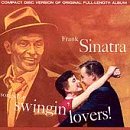|
It was Capitol Records producer Voyle Gilmore who had the inspired idea
of teaming Frank Sinatra and arranger-conductor Nelson Riddle. The two
first joined forces on the singer's second recording session for Capitol,
held April 30, 1953, at which were recorded four standards, and from the
beginning it was apparent that the rapport between the two was uncanny,
even magical. No other orchestrator had served Sinatra as well, with as
much taste, sensitivity and wittiness, and over the following decade he
acted as arranger-conductor on fully two-thirds of Sinatra's more than
300 Capitol recordings.
The reasons for this are immediately evident in the 15 selections that
comprise this classic album collaboration between the two. The product
of five separate recording sessions held in Capitol studios in October
of 1955 and January of the following year, SONGS FOR SWINGIN' LOVERS,
like the three Sinatra-Riddle albums that preceded it, had been conceived
as an integral set of recordings, the song materials having been selected
and the orchestrations devised to convey a consistent, unified mood -
bright, insouciant, urbane, witty, colored with the smoky pastel hues
and easy, bouyant rhythms of jazz.
Riddle was the perfect arranger to frame such effortlessly swinging settings
for the singer for he, like Sinatra himself, had come out of the big bands
that had ruled American popular music through the 1940s. Starting out
as a trombonist, Riddle had played in the orchestra of Tommy Dorsey -
the instrumentalist, incidentally, on whom Sinatra had patterned his smooth
legato phrasing style when he had been featured with the Dorsey band -
to which he soon had begun contributing arrangements in the band's popular
jazz-inflected style. Settling in los Angeles, Riddle sought to establish
himself as an orchestrator and quickly gained success with his deft, imaginative
writing for horns and strings. Prior to his fruitful association with
Sinatra he had written arrangements for a number of Capitol Records artists
and had in fact contributed to two of the label's biggest hits, Nat Cole's
MONA LISA and Ella Mae Morse's BLACKSMITH BLUES.
Still, there can be nodoubt that his collaboration with Sinatra, the
single greatest interpreter of popular song of our time, brought forth
Riddle's finest, most consistently resourceful writing. An utter perfectionist
when it came to commiting his art to record, Sinatra, if only by example,
always drew the best from his collaborators. "Working with Frank
was always a challenge," Riddle observed, "Never a relaxed man,
as Nat Cole was, for example, he was a perfectionist who drove himself
and everybody around him relentlessly...He showed me how to insist on
certain things from an orchestra, so I guess you could say I learned from
Frank like he learned from me. But we always did things his way. He knows
what's good for him and for the music. He expects your best - just that."
And just that's what we have here. Listening to the marvelously sympathetic,
effortlessly swinging orchestrations Riddle provided the singer on these
selections, it's easy to understand why the album is rightly considered
one of their landmark achievements - as satisfying today as when recorded
30 years ago, and just as fresh-sounding - and why Sinatra described Riddle
as "the greatest arranger in the world."
Riddle's contributions and those of the musicians notwithstanding, it
is Sinatra's show all the way and from the opening notes of the zesty
YOU MAKE ME FEEL SO YOUNG to the singer's final descending swoop on HOW
ABOUT YOU there's no doubt we are in the presence of greatness. The singer
sustains a mood of light-hearted bravado throughout the selections, his
nonchalant but, oh, so perfectly controlled singing matched up with an
absolutely stunning program of songs that brings out his artful best.
With almost two decades of experience behind him, Sinatra was at the very
peak of his form on these performances, his voice warm and ingratiating,
darker-hued than in the decade preceding his Capitol years and possessing
a rich, easy-sounding phrasing, conversational in character, that make
these performances so richly, timelessly rewarding and Sinatra's the ne
plus ultra of popular singing, the standard by which all others have
been and continue to be judged.
"Sinatra's singing on this album," noted critic John Rockwell
in his SINATRA, AN AMERICAN CLASSIC (Random House, 1984), "has a
verve and conviction that make his records from the Forties sound bland.
He has learned to tease and twist a vocal line without violating its integrity.
By now, he knows how to kick forward a song's rhythmic impetus by the
percussive articulation of key one-syllable words...The album as a whole
breathes with a delightful blend of Riddle's naughty sweetness and Sinatra's
witty bravado." Its judicious selection of songs, its consistent
emotional mood, Riddle's bracing orchestrations, and Sinatra's flawless,
ebullient singing - all combine to make SONGS FOR SWINGIN' LOVERS an all
but perfect album, onr of the singular achievements in a career marked
by numerous moments of greatness. Ars longa, after all.
Pete Welding
Capitol CDP 7 46570 2
You Make Me Feel So Young
It Happened In Monterey
You're Getting To Be A Habit With Me
You Brought A New Kind Of Love To Me
Too Marvelous For Words
Old Devil Moon
Pennies From Heaven
Lover Is Here To Stay
I've Got You Under My Skin
I Thought About You
We'll Be Together Again
Makin' Whoopee
Swingin' Down The Lane
Anything Goes
Buy Songs
For Swingin' Lovers from Amazon.co.uk.
|
|


